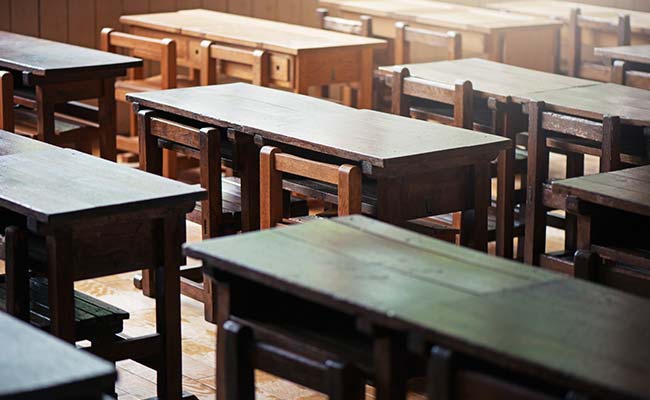

Experts said that the closure of educational institutions had a significant impact on the teaching-learning system.
New Delhi:
A group of public health experts recommended that schools and other educational institutions be reopened in a phased manner and, at the same time, stressed that the blockade should be suspended as a strategy to control the spread of the coronavirus.
The nationwide lockdown induced by COVID-19 in March prompted schools and universities to move to the virtual world for teaching and learning activities.
The recommendations were made in a report compiled by experts from the Indian Association of Public Health (IPHA), the Indian Association of Preventive and Social Medicine (IAPSM) and the Indian Association of Epidemiologists (IAE).
Recommending that the opening of schools and other educational institutions could be started in a phased manner, the experts said it is time to move towards normality.
“There must be a pragmatic approach, especially in areas where a sufficient population is already infected with SARS CoV-2 (as assessed by the expert committee). Even in low-infection areas, schools can be opened with proper security measures ( social distancing, alternative work days, etc.), and with adequate vigilance against any acceleration of the outbreaks due to schools ”, they pointed out.
Experts said that the closure of educational institutions, especially schools for children (5-18 years) has had a significant impact on the teaching-learning system, as well as on the mental health of children.
“The impact has been disproportionately greater in children from lower socioeconomic strata who do not have social capital for alternatives such as digital platforms. There is sufficient evidence available that infected young children are at extremely low risk of developing morbidity,” they said. .
The risk of young children transmitting corona infection to older family members would be the same as that of adult family members who are allowed to engage in activities outside the home environment, they said.
They also said that the blockade as a strategy to control contagion should be suspended.
“Geographically limited restrictions can be imposed for short periods in epidemiologically defined clusters. Cluster restrictions should be considered only in areas without community transmission,” they said.
The main purpose of the blockade was to curb the pandemic and buy time to be prepared to fight it, and this purpose has already been achieved, according to the report.
There is no evidence that any useful purpose was served by the weekend, intermittent or night shutdown, the domestic flight ban and the large containment zones, experts said.
“In big cities where there has already been a substantial spread (it can be assessed by the expert committee) there is no advantage of creating containment zones and aggressive testing,” they said.
The group also recommended that primary, secondary, and tertiary health care services, including inpatient and outpatient services, including routine and emergency surgeries, be resumed as soon as possible, at least in areas that are progressing toward higher levels of immunity and in cities and districts without cases.
In recommending quarantine and isolation policies, experts said they should be friendly to the community.
“The current policies, where the houses of all people who test positive are stamped, isolated by barricades, is creating fear in society. This practice must be abandoned immediately,” they said.
“When most states and districts are affected, there is no justification for the quarantine of interstate travelers who must be in mandatory quarantine in a facility (hotel or health center) (for 14 days). This must stop immediately “. they said.
Experts said that citizen-friendly measures should be followed, such as following home quarantine, which has been an effective strategy in many cities and states.
Experts recommended increasing health spending to 5 percent of GDP.
“Public health care must be significantly strengthened and improved, increasing overall public spending to at least 5% of GDP. Increasing health spending should focus on primary health care and strengthening human resources and infrastructure. rather than opening or strengthening tertiary care centers, “they said.
The 20-member COVID joint task force includes Dr. Shashi Kant, former IAPSM President, and Director, AIIMS Center for Community Medicine, New Delhi, Dr. Sanjay K Rai, National President, IPHA and Professor, CCM , AIIMS, Dr. Sujeet Kumar Singh, Director, National Center for Disease Control NCDC), Dr. DCS Reddy, Former Professor and Director, Community Medicine, IMS, BHU, Varanasi, and Dr. Rajesh Kumar, former Professor and director, DCM and SPH, PGIMER, Chandigarh.
Dr. Singh and Dr. Kant are members of the ICMR National Working Group on COVID-19, while Dr. Reddy chairs the ICMR research group on COVID-19 epidemiology and surveillance.
(Except for the headline, this story has not been edited by NDTV staff and is posted from a syndicated feed.)
.